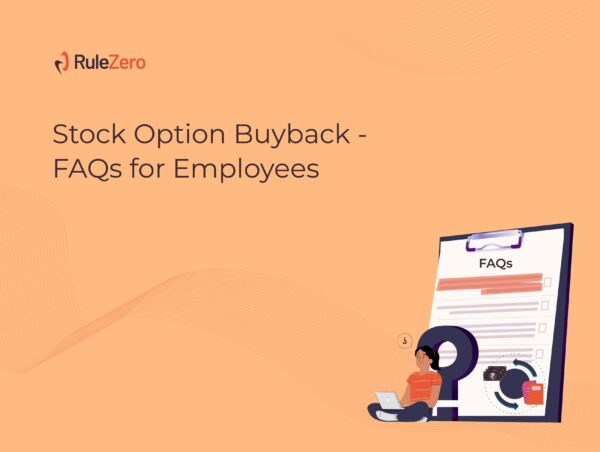Our discussions with the lawyer on the ESOP process were long, but insightful. He shared many real-life examples to help us understand the ESOP process better.
We took a quick lunch break and re-assembled in the conference room. To our dismay, they were adorned with bulky legal books. Both of us smiled wickedly and remembered the days of boarding when we despised reading such books.
The lawyer entered the room and our journey to the days of boarding was cut short in a jiffy. Back to ESOPs!
In this Part IV of the ESOP Series – Regulations governing ESOPs, I have summarised our discussions with the lawyer on the different laws to be complied with when a company issues ESOPs.
There are different laws governing a company. When a company issues stock options, it is required to adhere to the laws generally applicable to a company as well as the laws specifically applicable to the issue of shares / stock options.
The applicability of laws and the manner / extent of applicability also depends on the structure of the stock options, the residential status of the employee and similar factors. For instance, if Econative employs a Japanese national as an employee to harness his knowledge of the packaging technology, any issue of shares on exercise of ESOPs should comply with the provisions of FEMA.
Likewise, the compliances may be lesser in implementing ESOPs under a direct route as compared to a trust route. From the employees’ perspective, the trust route provides an exit mechanism to employees of unlisted companies, where there is no open market for the disposal of shares. From the employers’ perspective, the management of the stock option plan is taken care of by an independent entity which implements the plan, communicates with the employees and addresses their queries and grievances. Further, the voting rights in respect of shares held by the ESOP Trust are exercised by the ESOP trustees and not individuals. This reduces the governance issues involved when shares are held by multiple individuals, especially those who are no longer present in India. Considering that the trust route offers greater commercial advantages over decision making in the company, a company may go ahead with the trust route.
Now, let’s look into the specific regulations governing stock options.
Corporate Law
The Companies Act is one of the most important regulations governing the issue of stock options. Any company issuing stock options must comply with the provisions of the Companies Act, 2013 and the Companies (Share Capital and Debentures) Rules, 2014. Broadly, these provisions regulate:
- Whether an employee can be issued stock options – Generally, employees of the company or its holding or subsidiary companies can be granted stock options. An employee belonging to the promoter group or a director holding more than 10% of the share capital in the company cannot be granted the stock options (certain relaxations are provided to qualifying startups for 5 years from incorporation).
- Stock option structure including identification of employees or class of employees eligible for the offer, vesting conditions and timelines, exercise price and process, lock-in period post acquisition of shares and so on.
- Rights of the option holder before and after exercise – an option holder does not have a right to vote or receive dividend until the shares are actually issued upon exercise.
- Procedure for issue of stock options including preparation of the stock option plan, board approval, shareholders’ approval etc.
Compliances after the issue of stock options – maintenance of the Register of Employee Stock Options, filings with the MCA, issue of share certificates to the shareholder upon exercise etc.
Accounting
Issue of stock options entails a cost to the company and must be booked as an expense. Startups generally follow the iGAAP for accounting purposes. It provides guidance on the manner of accounting of the expense and the period of years for which the expense must be booked.
For instance, the cost of stock options is booked over the vesting period. The cost is arrived at based on the fair market value of shares of the company on the grant date. There are different methods of valuation of stock options; the Black Scholes model is the most popular amongst them.
Income Tax
From the company’s perspective:
The cost of stock options to be spread over the vesting period is a deductible expense for the company. The expense may be disallowed if it is not in accordance with the accounting guidelines applicable to the company.
The taxable value of stock options is considered as ‘perquisite’ for employees and is taxed as ‘Salaries’. The company must deduct tax on the perquisite value. In case of cash-settled SARs, tax is deducted before making the payment in case of SARs. When it comes to stock options, TDS on the notional perquisite value is deducted from the employee’s salary.
From the employee’s perspective:
Taxation of income from stock options is often a key factor determining the structure of the grants and more importantly, the success of any stock option plan. It also acts as a significant retention tool for the company (Check Series V– to understand how stock options act as a retention tool).
There is no taxation at the time of grant of options. The taxability arises at the time of exercise.
In equity settled stock options, there are 2 taxable events – one, at the time of exercise and another at the time of the ultimate sale of shares. The perquisite value of stock options is taxed as employment income at the applicable slab rates which could be as high as 42.74%. Capital gains on the ultimate sale of shares are taxed depending on whether they are long-term or short-term shares. In cash-settled options like Stock Appreciation Rights (SARs) or Phantom Equity, the income from exercise of options is taxed as employment income at the applicable slab rates.
Employees of eligible startups are entitled to deferment of tax payable for a period up to 4 years on satisfaction of certain conditions.
Besides, if shares are issued at a price lower than the fair market value of shares, the difference is taxed as income of the employee.
An employee exercising stock options does not receive any cash income at the time of exercise; yet tax is payable on a notional value. This is a very important factor which determines the success of the stock option plan.
FEMA
An Indian company can issue stock options to non-residents. Non-residents may be employed by the company itself or by its overseas holding company, subsidiary company or a joint venture.
Issue of shares to a non-resident is regulated by Foreign Direct Investment Regulations under FEMA. The regulation provides for the sectoral caps to be adhered to by the company and seeking approval in certain cases, the price at which shares can be issued, reporting by the Indian company etc. For instance, the shares on exercise cannot be issued at a price lower than the fair market value of shares of the company, calculated as prescribed.
Practical issues may arise if the fair market value of the company at the date of exercise is substantially different than the value on the date of grant.
Other regulations
In addition to the above, there are other regulations like Stamp Duty and Contract Act governing the issue of stock options. The Stock Option agreement between the company, employees and the ESOP Trust (if any) must be in compliance with the Contract Act in order to be a valid contract.
The agreements and shares issued on exercise must be duly stamped by paying stamp duty at the applicable rates. Likewise, listed companies are also governed by SEBI guidelines on issue of stock options.
There is a web of regulations governing any stock option plan. A company may setup an in-house compliance team or outsource the compliance to independent practitioners. Alternatively, there are certain platforms which can help a company in managing the ESOP process, the cap table and future planning.
More in this series
- Part V – ESOPs as a hiring strategy
- Part VI – Wealth creation through ESOPs










